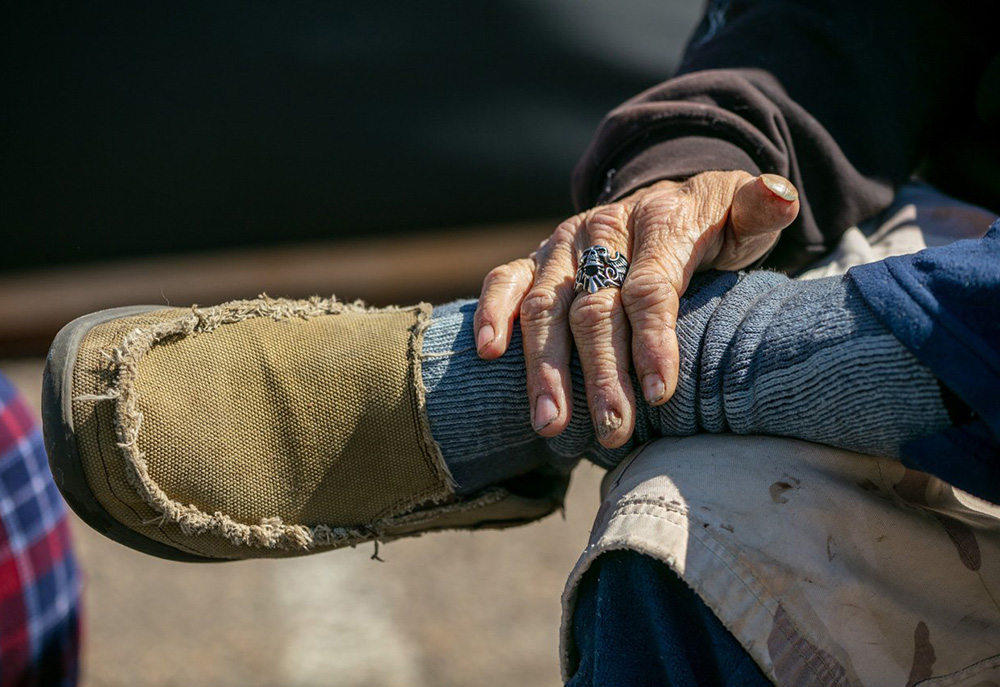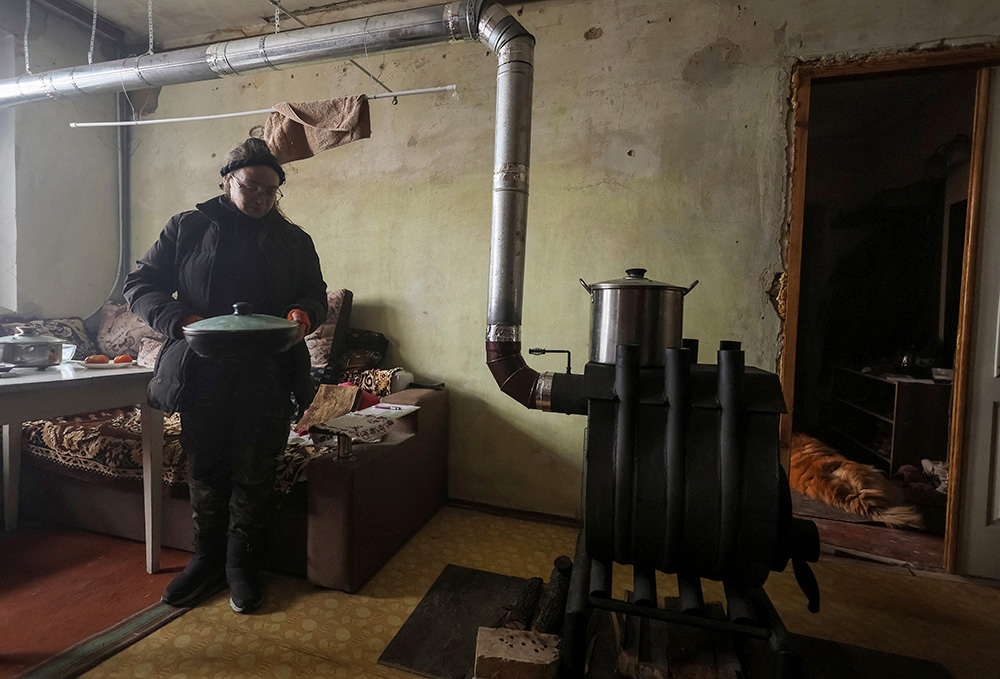
A homeless person is seen at Regis University's Safe Outdoor Space facility in Denver March 8, 2022. (CNS/Courtesy of Regis University/Barry Gutierrez)
Lent, that time of somber reflection, has begun. Many of us, after years of warmed-over helpings of pulpit porridge calling us to penance and fasting, might be ready for a new approach. Maybe something a little edgier than giving up chocolates or the occasional beer to connect to the world's suffering.
These days, who needs to be reminded of suffering? In a world of 24/7 digital media, we all bear witness to almost unspeakable tragedies daily. Yet, if your life is like mine, in a cushy suburb with a loving family, realities like homelessness, the war in Ukraine, and the environmental catastrophes piling up everywhere can feel at once both overwhelming and distant.
We can do something to close the gap between us and those living on what Pope Francis calls the margins of society. We can also act to make the overwhelming manageable in our own communities and neighborhoods.
I believe the church has something critically important to offer in all of this, especially during Lent. A lot of the issues listed above can aggravate the divisions and polarization so evident in American politics and society. We know that same polarization is reflected in the U.S. church.
Advertisement
But in my experience, there is an important something else. American Catholics all deeply hunger for unifying, sacramental, even mystical experiences that can reveal the sweetness of the Gospel, the Word that makes a difference in our lives.
As Catholics, we traditionally do our Lenten inner work through a discipline of fasting, prayer and almsgiving. Turns out, the discipline of fasting is now actually a "thing" in the non-churchgoing crowd, with measurable health and wellness benefits. Meditation and prayer are go-to practices by many who seek a calm-fix, or something more lasting, in the midst of hectic lives. Giving to worthy causes is something we all reflexively do when called to respond, be it for an animal shelter down the street or for earthquake victims in Syria or Turkey.
So what's left for the Catholic in Lent?
Perhaps the answer lies at the heart of our Gospel. Maybe this Lent, as we step away from the busyness to do some inner work, as we try to more closely align how we see with how Jesus sees, the Beatitudes would be a good starting point.
Jesus saw the world through a lens trained on the poor, the sorrowful, the meek, the powerless, the cast out and thrown-away, the persecuted, the insulted. He offered them hope by his word and action. We can hear his words in the Beatitudes. And with compassion, he would "cross the street," go to their side of the road
The mystical experience we Catholics hunger for today is not otherworldly, but is right here.
Let's imagine Jesus here, and start as he would start, go where he might go and invite his instinct to become our own. Let this be the Lenten fruit that ripens by Easter.
Here are a few suggestions for reviving and updating our Lenten practice this year.
Fast purposefully. Fast to see through the eyes of the homeless, hungry, naked, imprisoned, thrown-away, mentally ill or addicted, bullied or othered, the people God especially loves.
- Fast from warmth: Turn down the thermostat at home and sleep without a blanket — as a way to (baby steps) step off my curb, and begin to cross the street and feel what the unhoused feel.
- Fast from sleep, for a night or two — in solidarity with those who don't or can't have a peaceful moment to close their eyes — who today must live in fear for their basic safety. Fast from the rest and safety of our normal lives, to sense the risks, the fatigue, the anxiety of not knowing where next week's rent money will come from, or if a stray bullet will enter my window tonight or when the next missile attack will happen.
- Fast from the safety and convenience of available clean water: Draw your water from an outdoor spigot, and boil it before using it, to cook, to clean, to bathe.
- Fast from adequate clothing: Go shoeless for a day — and feel the pain of nakedness in winter.
- Fast from the confidence of feeling clean: Go without a bath/shower, for a day, or two, or three ... and feel the buildup of whatever it is that our unhoused or imprisoned brothers and sisters have no choice but to endure.

Local resident Tetiana Reznychenko prepares food at a wood stove installed in her flat, which has no electricity, heating and water, on the fifth floor of an apartment building destroyed by a Russian military strike Horenka, Ukraine, in this photo taken Nov. 19, 2022. (CNS/Reuters/Gleb Garanich)
Pray expectantly. Invite God to share the flood of feelings and insights your fasting will surely bring about.
- Notice the difference between your "normal" and the normal of those who have no option but live it perpetually.
- Bring your fasting experiences (fatigue, cold, irritability, discomfort, pain, maybe shame or guilt) as an offering to God.
- Be open to being changed. In fact, hope for it.
- Offer God your fast as a symbol of your desire to be his change agent.
Respond generously. Let your fasting and prayer bear fruit by responding creatively, intelligently, compassionately, immediately.
- Almsgiving doesn't have to be about money. Make it about what money represents, which is the potential power to effect change. Give your power, mine your potential, and give generously, and immediately — as immediately as you would to your lover, or to your child, or to your aging elder, or to a friend whom you love, when they come to you needing what you have to give.
- Respond with immediacy, with the instinct to drop everything, because now is the only time that matters.
The mystical experience we Catholics hunger for today is not otherworldly, but is right here. It will be the fruit of compassion, born from purposeful fasting, prayer and creative alms focused on those whom God especially loves, the people Jesus sees in the Beatitudes.
By Easter, the fruit will ripen, the taste will be sweet, and the bite juicy and overflowing.




